
Topics
Guests
- Neve GordonIsraeli political scientist who was the first director of Physicians for Human Rights-Israel.
- Guy Shalevmedical anthropologist and the executive director of Physicians for Human Rights-Israel.
We speak to political scientist Neve Gordon and medical anthropologist Guy Shalev about their new article, “The Shame of Israeli Medicine,” which looks at the “complicity of the Israeli medical establishment with Israel’s egregious violations of international law.” The article’s third author, Osama Tanous, is a Palestinian citizen of Israel and has not been able to make media appearances for fear of reprisal by the Israeli government. “The Israeli medical establishment in general identifies with Israel’s colonial project and puts the colonial project over the most basic ethical principles of their profession,” says Gordon, who previously served as the inaugural director of the organization Physicians for Human Rights-Israel. Shalev, the current executive director of the group, connects the Israeli military’s targeting of healthcare workers and infrastructure in Gaza with its silencing of the great number of Palestinians who make up the medical workforce in Israel. The authors call for an international boycott of Israeli medical institutions, until “Israel stops its colonial project, [and] after the Palestinians receive liberation and self-determination.”
Transcript
AMY GOODMAN: This is Democracy Now!, democracynow.org. I’m Amy Goodman, with Nermeen Shaikh.
NERMEEN SHAIKH: Earlier today, Israel attacked the Al-Ahli Baptist Hospital in Gaza City. It marked the eighth time the hospital has been attacked over the past 600 days. Three Palestinian journalists were killed at the hospital. A fourth journalist was seriously wounded. We turn now to look at how the Israeli medical establishment has responded to Israel’s systematic attacks on Gaza’s health system.
AMY GOODMAN: We’re joined now by the co-authors of a new article headlined “The Shame of Israeli Medicine,” published in The New York Review of Books. Joining us in Tel Aviv, in Israel, is the medical anthropologist Guy Shalev, who serves as executive director of Physicians for Human Rights-Israel. And in London, the Israeli political scientist Neve Gordon, who was the first director of Physicians for Human Rights-Israel, he’s a professor of international law and human rights at Queen Mary University of London.
We welcome you both to Democracy Now! Professor Neve Gordon, let’s begin with you. Talk about what you found.
NEVE GORDON: What we found is that the support for Israel’s assault on Gaza, the genocidal assault, including the decimation of its medical system, including the killing of 1,400 health workers, including the detention and disappearance of 400 medical doctors and healthcare workers, including the torture of detainees, has been supported by the Israeli medical establishment through and through, whether it’s from the top, the Israeli Medical Association, that represents 95% of Israeli doctors, the other healthcare associations, including the Nursing Association and the psychological associations and their ethical committees.
We found that hospitals did not accept Palestinian detainees who were wounded and needed medical care. We found that doctors inside hospitals were unwilling to treat Palestinian detainees or did not demand that the shackles from their legs and their arms and their blindfold be removed before they were treated. We found that doctors did not provide painkillers to Palestinians, claiming that they should suffer from the pain. We found doctors in Israeli hospitals that sent, posted genocidal messages on their private social media accounts. We found persecution of medical doctors and nurses, Palestinian medical doctors and nurses, in the Israeli establishment. So, there’s a whole system. The whole medical establishment inside Israel has been actually supporting Israel’s assault on the Palestinian people, and particularly on its healthcare system.
NERMEEN SHAIKH: Now, Guy Shalev, you are joining us from Tel Aviv. You are the executive director of Physicians for Human Rights-Israel. It is this organization, your organization, that gathered testimony from 24 of these Palestinian health workers. Can you explain how the testimony was collected, and, you know, the key things, what most surprised you about what you found?
GUY SHALEV: Right. So, first of all, it was impossible to collect testimonies for many months, since the beginning of the war. In the beginning, there was no access to detainees. We could not send lawyers to visit them. We could not have any kind of supervision of their conditions of how they’re being held. After approximately six months, we could have starting — we could start to send lawyers to visit them, to collect the testimonies.
And then, what we heard was just impossible to hear: doctors that were detained while they were doing their work in hospitals, other doctors who were detained while crossing checkpoints across Gaza, after the soldiers found out that they are doctors, and then being taken to facilities in Israel — most famous, probably infamous, is the Sde Teiman facility — being subjected to torture, medical neglect, violence, starvation. Four doctors — three doctors and one paramedic died in Israeli facilities. These are four out of the 90 Palestinian detainees who died in the past 20 months.
And we tried to figure out what was the reason why doctors were targeted in such a way. And we realized that in their investigations, they were asked to provide information or kind of reveal the structure of hospitals and what they know, which is a violation of the international law and protection of medical workers. You cannot detain a medical worker for the purpose of collecting information, if you don’t have any evidence that they violated any law. And in fact, these people, most of these people, were held without a trial, without charges. Many of them are still held. Approximately 150 medical personnel are still held in Israeli detention facilities.
NERMEEN SHAIKH: And, Guy Shalev, you also point to an extraordinary statistic regarding the number of Palestinians who work in the Israeli medical establishment. You say Palestinians comprise 25% of all doctors and almost 50% of all new doctors and nurses in Israel. So, can you explain how they have been treated in the months since October 7th, these Palestinians who work in Israeli hospitals?
GUY SHALEV: Right. And, yes, first of all, these are amazing numbers, and this is the outcome of a long process of many years of Palestinians studying medicine, both in Israel and abroad, and choosing medicine as their kind of profession for the reasons that many people in the world choose that profession, but also for the reason that many minorities and people of marginal communities choose medicine, because they see that as an opportunity for social mobility, an opportunity to be accepted as equal. And that is why we see a lot of doctors in the Israeli medical system.
And unfortunately, this ideal of a system that is — that considers them as equal was never a reality, and definitely not after October 7, when there was basically a witch hunt of Palestinian medical workers in the Israeli system. Social media profiles were scanned to see whatever they’re posting there. And then a very large number of doctors and medical workers were subjected to hearings and other kind of processes, including firing doctors and medical workers for just the most basic social media posts, such as supporting children in Gaza or just feeling compassion for the people of Gaza. And it created this atmosphere that basically silenced and censored an entire group of doctors and medical workers in the Israeli system.
AMY GOODMAN: We’re speaking with two of the three authors of the piece, “The Shame of Israeli Medicine,” published in The New York Review of Books. We’re speaking with the medical anthropologist Guy Shalev in Tel Aviv and with Neve Gordon, professor, speaking to us from London. The third author is Dr. Osama Tanous, a pediatrician, board member of Physicians for Human Rights-Israel. He was advised by his lawyers not to do the interview. Guy Shalev, can you explain why?
GUY SHALEV: Yes, this is exactly what we just talked about. It is just too risky for a Palestinian citizen of Israel to be publicly kind of resisting the war, publicly criticizing the Israeli establishment. And we’ve seen cases. For example, professor Nadera Shalhoub, a very famous professor in the Hebrew University, who participated — was interviewed in a podcast and was later — had to resign from the university for very basic kind of critical opinions, professional critical opinions she had over the Israeli policies in Gaza. So, the risk is, unfortunately, high. And we are — we’re sorry that his voice is silenced once more, once again, because Neve and I are here, and Osama is not.
NERMEEN SHAIKH: And, Professor Neve Gordon, if you could say what exactly are you calling for?
NEVE GORDON: Well, I think what we managed to show in the article is the complicity of the Israeli medical establishment with Israel’s egregious violations of international law, including the Genocide Convention. And what we also know from past experience and from what we detail in the article is that change will not emerge from within without pressure from without.
And so, what we think — or at least I think — is that the international medical establishment and medical community needs to put pressure on their counterparts in Israel in order that they raise their voice against Israel’s policies. The Israeli medical establishment in general identifies with Israel’s colonial project and puts the colonial project over the most basic ethical principles of their profession. And that, we think, needs to change. So, one very practical idea is that students and staff in research institutions in the United States, Canada, in the U.K., in Europe map the kinds of partnerships their institutions have with Israeli medical institutions, with Israeli research teams, with Israeli medical corporations and demand from their own institutions to cut these partnerships, to cut ties with these partnerships, to end the contracts with Israeli medical corporations — not as a principle, but as a strategy, saying to their Israeli counterparts, “We’ll be happy to carry out these partnerships again, we’ll be happy to do business, but only after Israel stops its colonial project, after the Palestinians receive liberation and self-determination.” It is time, we think, that the international community boycott the Israeli establishment in order to bring about change and to stop this genocide we’re witnessing.
AMY GOODMAN: Neve Gordon, we want to thank you for being with us, Israeli political scientist, the first director of Physicians for Human Rights-Israel. He’s a professor of international law and human rights at Queen Mary University of London, speaking to us from London. And Guy Shalev, executive director of Physicians for Human Rights-Israel, speaking to us from Tel Aviv. We’ll link to your new article, “The Shame of Israeli Medicine,” published in The New York Review of Books.
Next up, we go to the British journalist Carole Cadwalladr, talking about taking on the broligarchy. Back in 20 seconds.
[break]
AMY GOODMAN: “Black Spartacus Heart Attack Machine” by Tom Morello here in our Democracy Now! studio.

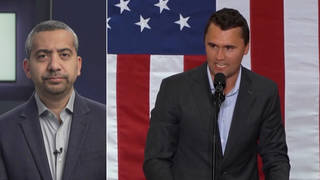
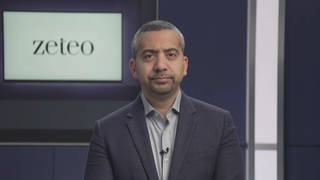
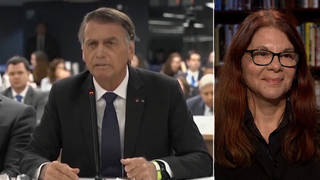
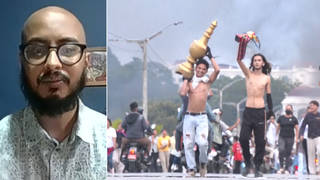






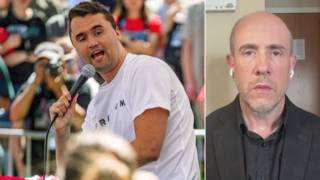
Media Options